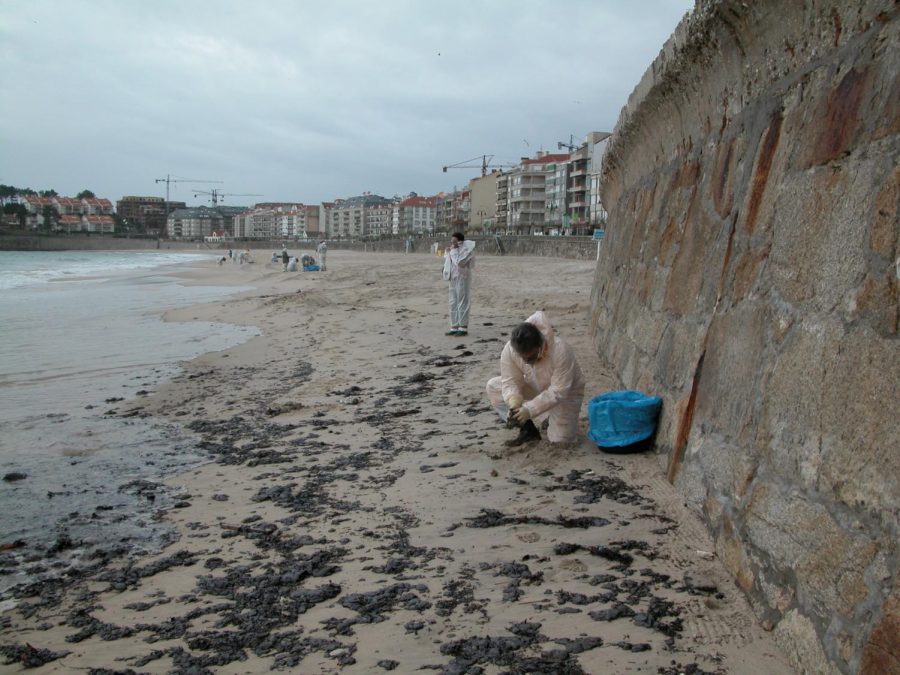Why We Should Fix Our Unhealthy Dependency on Oil
October 30, 2021
The smell of diesel and tar hung in the coastal air as clumps of crude oil and dead birds and fish washed onto the shores. Crew worked feverishly to clean the oil slick that lay on the top of the water, to prevent damage to the delicate coastal marshlands, which were essential for migratory birds.
The nation’s unhealthy dependence on oil has always been problematic, and the Orange County coastline was the most recent casualty of this. On Oct. 2, in one of the biggest California oil spills in decades, a pipeline connected to an offshoot oil platform off the coast of Huntington Beach released at least 126,000 gallons of crude oil.
Most city beaches from Huntington to Laguna were closed, and officials estimated that the affected beaches could be closed for weeks or even months due to the large chunks of tar washing ashore and its effect on sensitive ocean habitats.
This spill originated from a broken pipeline that runs between the Port of Long Beach and a processing platform called Elly, which was installed in 1980. Elly and two production platforms sit above a large reservoir of oil in waters overseen by the U.S. Department of the Interior. Elly is part of a complex that has a long record of federal non-compliance incidents and violations.
The company that owns Elly suggested that the pipeline could have been struck by a ship’s anchor, so the Coast Guard is investigating that as one of the possible scenarios for the rupture.
The aging oil infrastructure off the coast risks another spill occurring as well as releasing toxic pollution into the air and water; some refer to these facilities as “time bombs” and feel as though the federal authorities may not be giving them enough scrutiny.
Many of these platforms are also nearing the end of their useful life. By selling these old assets to the other smaller businesses, the expenses to maintain them may be too much. This leads to a need for federal intervention to begin responsibly phasing out drilling now to avoid greater damage to not only the ocean’s ecosystem and the environment but also to take a step towards building a cleaner, more sustainable energy future.
Even a change in drilling permits, which haven’t been issued since the 1980s, under former President Trump received heavy backlash since his administration sought to open all federal waters off the U.S. coastline to oil and natural gas exploration.
California Senator Dianne Feinstein proposed a bill in January 2021 that would permanently bar the federal government from allowing new leases for exploration and the development or production of oil or natural gas off the coast of California.
It’s not hard to understand why states don’t want to see more coastal drilling. Local economies are dependent on tourism, commercial and recreational fishing, leisure boating, and other activities that benefit from clean, healthy coastal waters. Take Huntington Beach; officials had to cancel the final day of the three-day Pacific Airshow, which usually draws thousands of people to watch flyovers by the U.S. Navy Blue Angels and other jets due to the oil spill that happened on Oct. 2.
Similar to fossil fuels, the overuse of drilling, not just on coasts but for fossil fuels as well, is deeply impacting our environment. Pollution and climate change are already significant problems that stem from using fossil fuels and oils. When fossil fuels are burned, they release nitrogen oxides into the atmosphere, which contribute to pollution like the formation of smog and acid rain. Human activities, particularly the pruning of fossil fuels, have increased the concentration of greenhouse gases in Earth’s atmosphere, which causes the planet to warm up. Also, the over drilling will cause the resources to deplete, which leads to an increase in price for those items.
The Orange County coast spill illustrates that the threat to the coastal environment isn’t just hypothetical; it shows that we need to move much faster to phase out coastal oil drilling to fix our unhealthy dependency on oil.
Photo Courtesy of Adela Leiro

